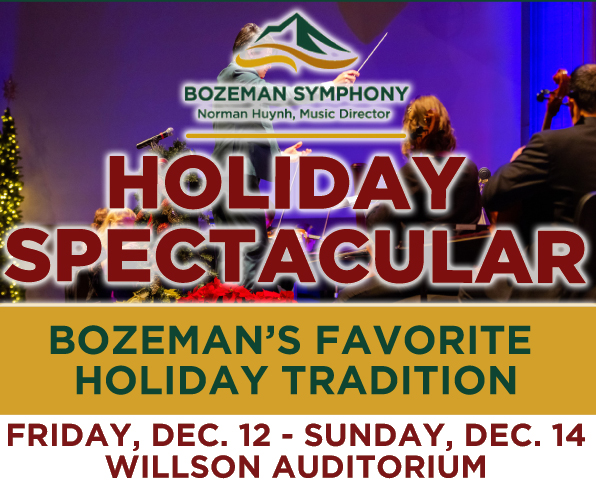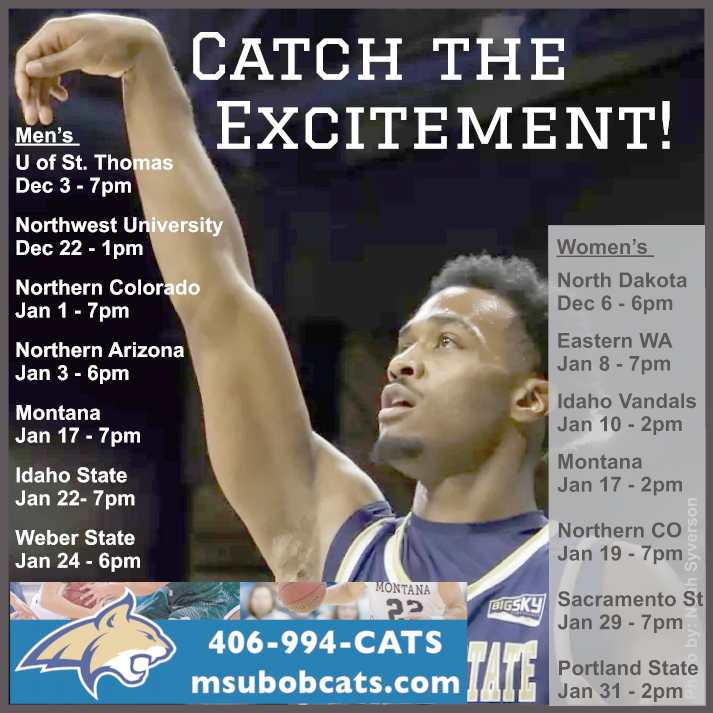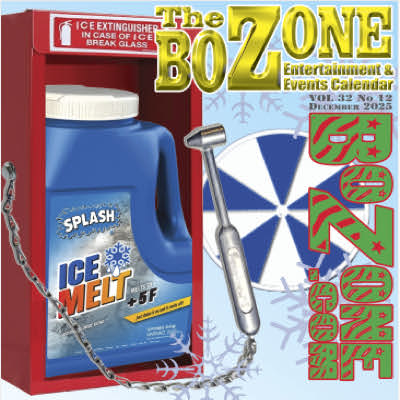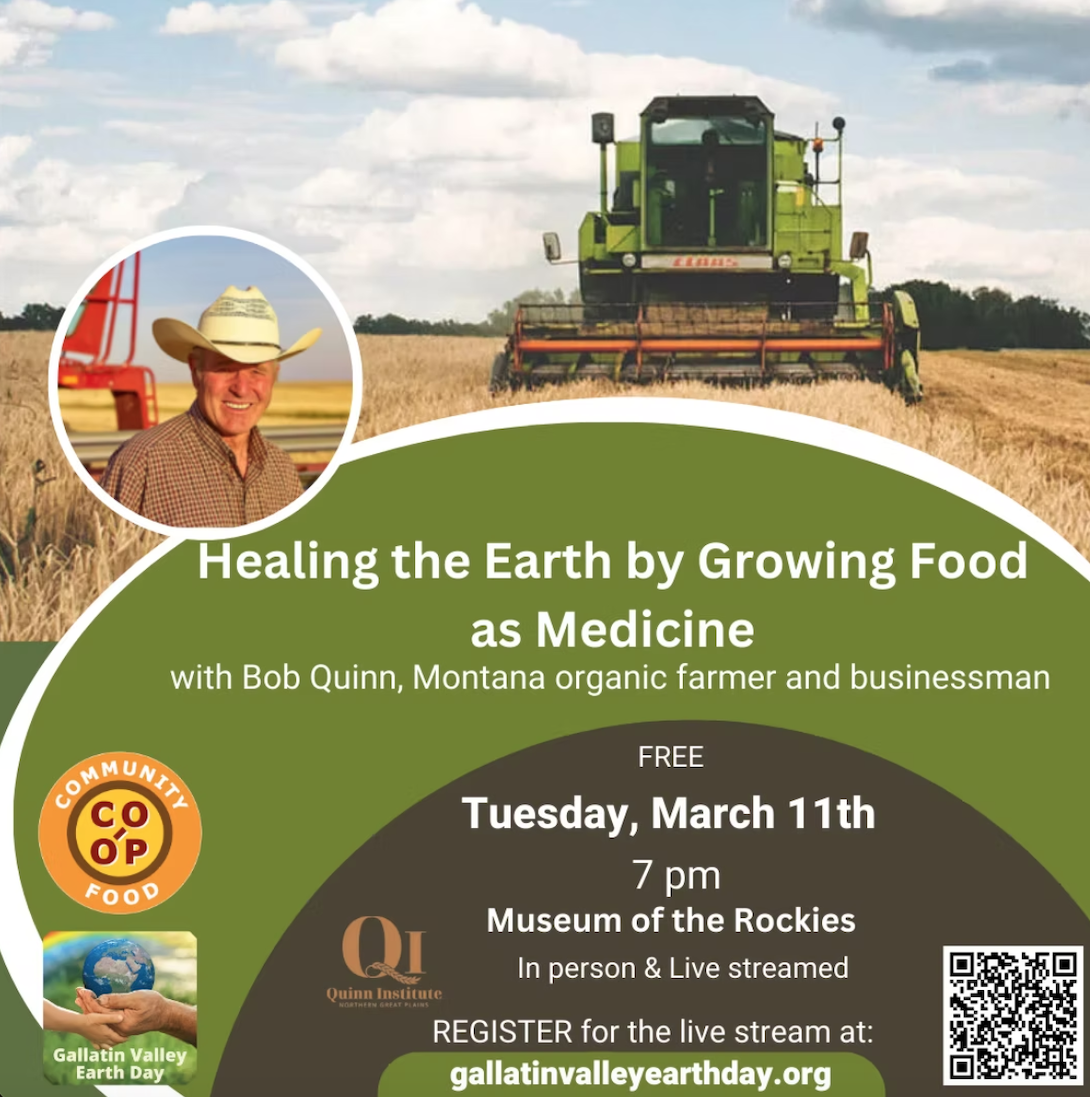Bozeman hosts evening of story, song & Irish charm at Ellen
Famed folk group The Irish Rovers are back in Southwest Montana on February 22nd with a farewell show at Downtown Bozeman’s historic Ellen Theatre.
Based in Canada but deeply rooted in the Emerald Isle, the ensemble has charmed audiences around the world for more than a half century. During what is their final world tour, the band hopes to sing a proper farewell to all those they’ve entertained over the years. After more than 40 albums released in North America, and many more internationally, the Rovers continue to receive raves for their recordings and performances.
In anticipation of their Ellen performance, the Rolling Zone spoke with Irish Rovers founder George Millar about the parting tour, career reflections, and just what happened to those unicorns on the shore.
RZ: Hello, George. We’re catching you in Hawaii. Thanks for taking some time out of your trip to speak with me. How are things going your way?
GM: We’re in Maui, my wife and I. It’s about 77º today, a wee bit of clouds, but I certainly can’t complain because I’ve spent enough Canadian winters to appreciate being here for the next couple of weeks.
RZ: Bozeman is lucky enough to be hosting one of The Irish Rovers’ send-off shows at The Ellen on Feb. 22nd. What do the fellas have planned for these swan song performances?
GM: When people are paying their money, they want to hear what they’re familiar with. And of course that’s why we’ll do “The Unicorn,” we’ll sing the “Black Velvet Band,” and we might even do “The Orange and the Green.” You have to give them the songs that they want to hear, I [found] that out over the years. I always try to put in new songs, but if you put in too many people say, ‘Well how come you didn’t do that song you did last time?’ So, we’ll sing the songs they want to hear – and if anybody’s not hearing what they want, they can yell out and request the song, too.
RZ: What prompted the Rovers’ decision that this would be the last large-scale world tour, some half century after the band’s formation?
GM: I think it’s just time and everybody’s still in good spirits, so we thought while we’re still feeling good we’d take a final plunge at it. [The tour] starts there and goes through to California, and then we end up with three or four shows in Canada, and then from Toronto we fly to Ireland for three shows. We’re taking in a lot of spots and, as we get older, the touring of course gets harder and harder. We’re no longer 40 or 50 [laughs], we’re a little bit older than that. We’re always going to keep doing CDs and special shows, so it’s not like the people are going to finally get rid of us because we’re still going to pop up here and there. We’re just sort of winding down a wee bit, that’s all.
RZ: Well you can do that, it’s been a long time coming.
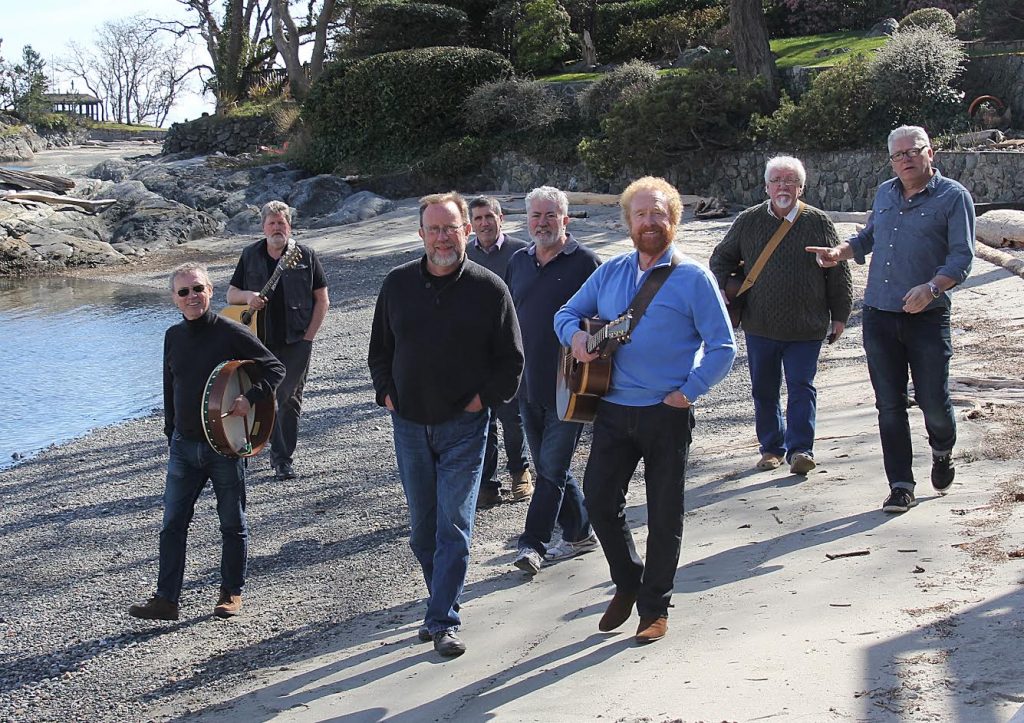
Morris Crum, Gerry O’Connor, George Millar, Ian Millar, Geoffrey Kelly
GM: The secret is that we still thoroughly enjoy what we’re doing, and while the people still want to see us, we’ll keep popping up and do the odd show here and there, keep our hand in. We’re blessed to have an audience that still wants to see us after all these years.
RZ: The ‘Kings of Celtic’ are releasing Up Among the Heather, The Scottish Album at the top of February. Tell us a little bit about the album and how the Scots have influenced this band of Irishmen.
GM: We’re from the north of Ireland, very close to Scotland, and we’ve always enjoyed singing Scottish songs. We have a whole bunch of them and we just thought, you know, before we retire completely, let’s do an album of just Scottish songs. There’s some really really good [ones] and the Scots like to drink their whiskey as much as the Irish do, so we had plenty of material to draw from.
RZ: Funny! Looking forward to hearing those tunes.
GM: We have about three or four songs that Robert “Rabbie” Burns actually wrote back in the 1700s, revived some of those songs. The Scots have a great humor about them, and the songs transposed really well into our style. We’ve always done Scottish material, three or four songs per show, so it just felt like the thing to do. We thoroughly enjoyed researching them – and you have to drink a lot of Scotch when you’re researching Scottish songs. We were able to survive all of that. We took a trip through the Highlands and into Glasgow and Edinburgh, and the people of Scotland treat us royally. They’re really really nice people.
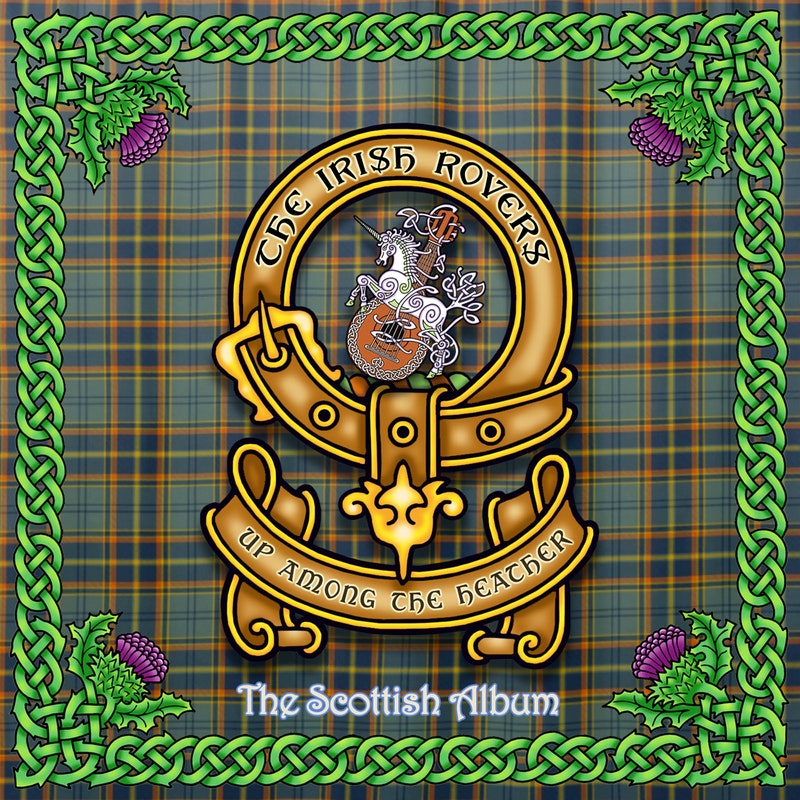
RZ: Hopefully one or two of those songs will make it into the show, even though you’ve got so many to choose from already.
GM: As a matter of fact, I’ve already added a couple of those Scottish songs from the new CD into the show, so you will indeed hear some of them as well.
RZ: A founding member, you’re also the Rovers’ primary songwriter. How do you decide whether a tune is meant to be cheerful and upbeat or if it’s going to take a more serious tone?
GM: It all depends of course on the subject you’re writing about. Writing something about the battles of Glencoe or Culloden field, it’s not going to be too happy and gaiety. And on the other hand, I’ve written a new song on [Up Among the Heather] called “The Flower of Inverness” about this young girl in the Highlands. And so, your words will dictate what your tune is going to be. If they’re sort of happy-go-lucky, then the tune has to be similar to that. That’s basically how it’s done, there’s no great scientific secret. It’s just pure luck when you hit upon words and tunes together at the same time. You have to work at it as well, you just don’t say ‘I’ll write a song today.’ You have to sit down with your pad of yellow paper and pencil and start writing and see if anything comes. And more times out of not, you’ll take most of that writing and scrunch it up and throw it in the garbage.
RZ: All part of the process. Now, we of course have to ask about “The Unicorn,” the Shel Silverstein-penned title track from the accompanying album that put the Rovers on the map. Imagine a career had that song not been released – where would the Rovers be?
GM: I have the feeling it would have been a very short life for The Irish Rovers. In those days, we were playing the folk clubs of the day. That song [was] the one that took us out of all of those dark little clubs and put us onto the stages of the world where we are after 50 years. We’re still doing that, so without that song, we would’ve been back picking potatoes in Ireland or something. As my mother used to say, ‘When are you going to stop this nonsense and get a real job?’ I said, ‘This is a job’ and she said, ‘No it’s not. You’re singing, that’s not a job.’ So, that was a very lucky little song for us and that’s why I said earlier, we’re blessed we can still do what we want after these years. It’s great, it’s lovely. And without the fans, none of this happens.
RZ: On the 2017 reissue, The Unicorn, The Continuing Story, a sequel track, “Narwhal,” finally answers the question of what happened to the unicorns when the ark left them stranded on the shore. After fifty years of suspense, why bring the story full circle now?
GM: All of these years, especially the little kids in the audience, their mothers would say, ‘They didn’t really drown, did they?’ I had to finally say of course not, no. It was a mistake and God has turned them into narwhal so that they’re still alive and they’re in the ocean. They didn’t drown at all, they just developed into a different animal, so rest easy.
RZ: Whew!
GM: The strange thing, first of all, the unicorn [is on] the national coat of arms for Scotland. I was also in France not too long ago, and we went to the Louvre and were looking at all this wonderful art. Almost every piece of art from every country in the world back in the 14th, 15th centuries all had unicorns. That’s making me think maybe there’s more to this little unicorn than we all think. Maybe there was a unicorn, and now it’s swimming in the ocean. Stranger than fiction.
RZ: Live music is a big draw for us in the Rocky Mountain West, surely in Canada as well, partly because it gives us something to do in the winter. But my question is about Irish culture – how important is music to its continued prosperity?
GM: There is nothing [more important] to Irish culture than music and storytelling. Without that culture over the years, Ireland would’ve been worse off because the people had very little. First of all, there was that awful potato famine that wiped out an awful lot of people, and it was their music that kept them going. When we first emigrated from Ireland when I was about 12 or 14 years old, we didn’t even have a television in those days. All we had was the radio. So every weekend, [there] would be a soiree in our house where everybody came and played music. You played the spoons, you sang a song, or you did something. And it wasn’t just our house, probably more than three quarters of the houses in Ireland did that. They couldn’t really afford to go out much, so everybody came and brought their own drink and instruments and they played and entertained themselves. Music is the backbone of Ireland, as far as I can see. Everybody plays music and everybody can sing and everybody can tell a joke or a gag or tell a wee story. And still, if you go into the pubs in Ireland, people will start singing and playing away on any given night. It’s still a big part of the culture and I’m so happy for that.
RZ: More than five decades under your belt, what’s one major reflection you can share regarding your time with the Irish Rovers and the audiences you’ve performed for?
GM: The one thing that really pops into my head is the people we’ve met over the years. We had a few television shows and a lot of guest stars from Johnny Cash to Roger Miller, to all of the biggest country stars in the world and all of the Irish and English acts, they would come over as well. We did a tour for the Canadian government through Japan and met some of the nicest people, and they loved our music. We have played for the Native Americans and Native Canadians, we’ve done some of the outposts in America and Canada playing hockey arenas, and they seem to love our music as well. Just to meet these people – there’s an awful lot of kind people in this world. I know sometimes we’re going through hard times, but deep down, the people that I have met through our traveling are kind and considerate. I love them all and that probably is the highlight of being in a career like this where you meet so many different cultures and people. At the end of the day, they’re all basically the same – they want to raise a family, they want to work, do the right thing, then have a bit of fun at night. It’s a wonderful world.
RZ: That it is, George. A final message before we see you?
GM: Hopefully we’ll have a nice show and get people out of the cold for two hours – and maybe they’ll stay warm right through the winter, coming spring and next summer as well. That’s all we’re trying to do is make some people happy for a couple hours. When we do that, then we’ve done our job.
The Irish Rovers come to Downtown Bozeman’s Ellen Theatre on Friday, February 22nd. The music begins at 7pm. Tickets to the all-ages show are $31 at www.theellentheatre.org – and going fast! Wine, beer, and other refreshments will be sold in the lobby ahead of the performance.
Prior to the Bozeman show, Millar and the Rovers will play the Alberta Bair Theater in Billings on Thursday, Feb. 21st. Ticketing information is available at www.albertabairtheater.org.
Learn more about The Irish Rovers at www.theirishroversmusic.com or find them on Facebook for updated tour details and other announcements. Their just-released album, Up Among the Heather, is available now. •
